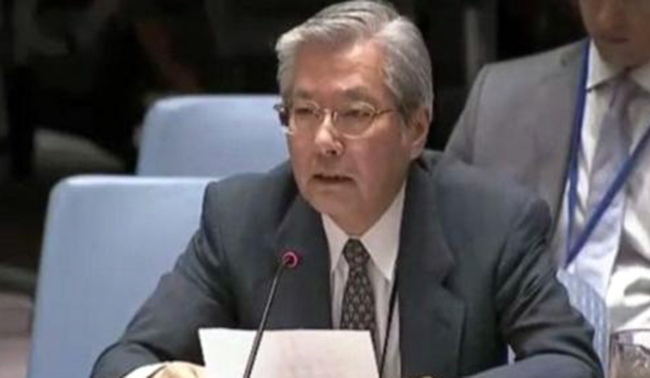KABUL - UN Secretary-General’s Special Representative for Afghanistan Mr. Tadamichi Yamamoto has said that Afghanistan still had a long way to go to meet fully the needs of its people, a statment from the United Nation Assistance Mission in Afghanistan (UNAMA) said on Thursday.
Briefing the United Nation Security Council (UNSC) on situation in Afghanistan on Wednesday he said the upcoming Brussels Conference success would provide the time and space for the Afghan government to move towards stability and self-reliance.
“In order to meet its challenges, the government must be able to act effectively. The current precarious political situation, including the tensions between the two leaders of the unity government, must be brought to a resolution. A way must be found to ensure stability in the government administration for the long term,” he said.
The envoy believed as one of the world’s most aid-dependent countries, it would be difficult for Afghanistan to achieve self-reliance as long as there has been conflict. The conflict diverted resources, which would be better spent on developing Afghanistan and helping its people. Peace was therefore a requirement. It was imperative that avenues for peace be explored with the utmost urgency and seriousness.
During his remarks, the UN special envoy welcomed President Ghani’s comprehensive, long-term approach to tackling corruption, which sought to develop the architecture needed to prevent corruption, as well as held those responsible for corruption to account.
“The referral of the first cases to the Anti-Corruption Justice Centre demonstrates the Government’s resolve. Successful, just, prosecutions would go a long way towards boosting public confidence,” the envoy said.
These achievements establish a firm foundation for the Brussels Conference. By demonstrating the government’s commitment to development and economic growth and stability, they can build confidence that development funds will be used for credible, effective plans.
The UN top envoy for Afghanistan welcomed the inclusiveness of the Government’s vision for the Brussels Conference. Government attention to poverty reduction at the recent JCMB was widely appreciated.
He said the National Unity Government faced fundamental challenges, both from outside and from within. Security and political stability were the most fundamental.
On the security front, this has been another difficult year for Afghanistan. Intensive fighting continued in hotspots around the country, while Kabul had been the target of a series of horrendous suicide attacks.
Several provincial capitals – such as Lashkar Gah, Tirin Kot and Kunduz City – have been under serious pressure, but none had fallen. The Afghan National Security and Defence Forces had been able to display more effective responses compared to last year and, coupled with tactical operations, they have been able – for the most part – to hold their ground, he observed.
The diplomat said: “Impact of the conflict on civilians remained severe, however. It was with a heavy heart that I must report that, yet again, year on year civilian casualty figures are trending upwards. Nowhere is this trend more apparent than for children, among whom there has been an 18 per cent increase in casualties, with 388 children killed in six months.”
The attack – claimed by ISIL – against a demonstration in Kabul on 23 July was a particularly gruesome incident, with 85 civilians killed. The government promised to investigate in full. UNAMA would share the findings of its own investigation with relevant stakeholders, he said
“I must once again remind all parties to the conflict to strictly abide by their obligation under international human rights and humanitarian law to always place the preservation of human life above any other consideration; and to give a measurable effect to their commitment to the protection of civilians, women and children in particular. Accountability for violations of these commitments remains weak and must be strengthened by all parties,” he remarked.
The international community is deeply committed to supporting the National Unity Government, and would be reassured by continued stability and its effectiveness.
Tadamichi said Peace for Afghanistan was a necessity. Without peace, Afghans would continue to suffer and economic growth and prosperity would not materialize.
The Taliban had still not demonstrated explicitly a clear commitment to a peace process, despite the many offers of engagement by President Ghani and the international community.
The agreement being negotiated between the Afghan Government and Hizb-e Islami showed that the Government was sincere about negotiations. Experience showed that peace processes could take months and years. Measures should be taken to build confidence between the Government and the Taliban, to prepare the way for substantive talks. The sooner a process is started, the less Afghans will suffer.
He urged both sides to come together to find a lasting peace for Afghanistan.
He said Afghanistan had an opportunity to build on the achievements of the past fifteen years and move towards stability and self-reliance. With effective government and the continued support of the international community it has every chance of succeeding. (Pajhwok)
Home » Afghanistan » Afghanistan Needs Int’l Community Support to Meet Challenges: UNAMA
Afghanistan Needs Int’l Community Support to Meet Challenges: UNAMA

